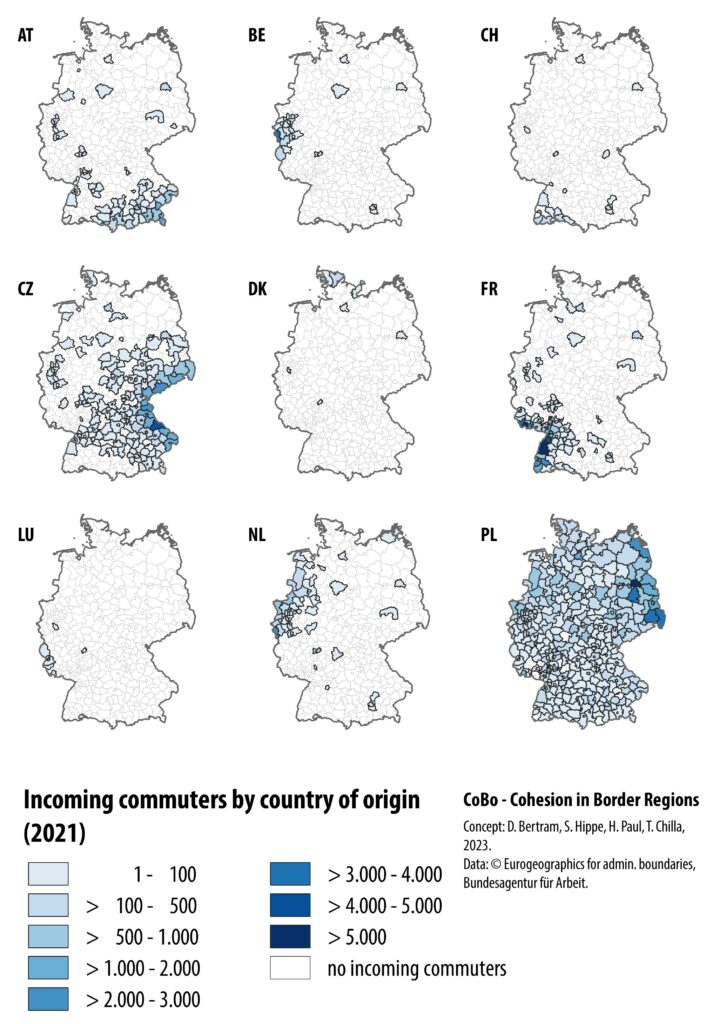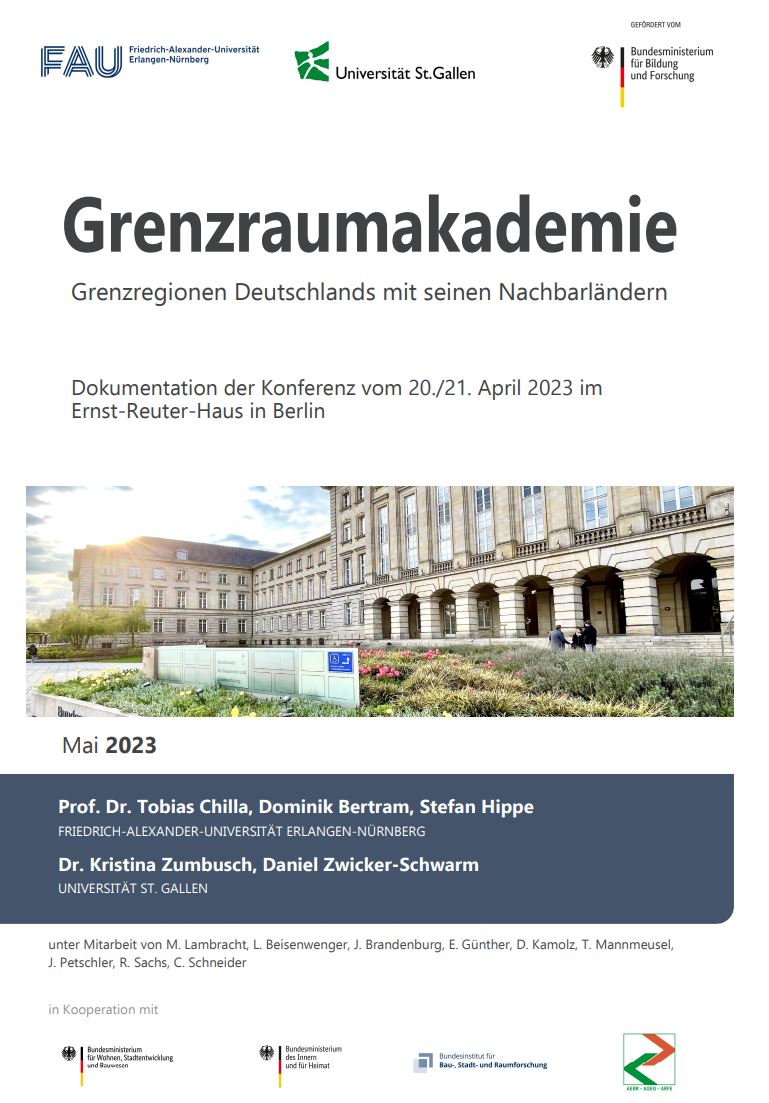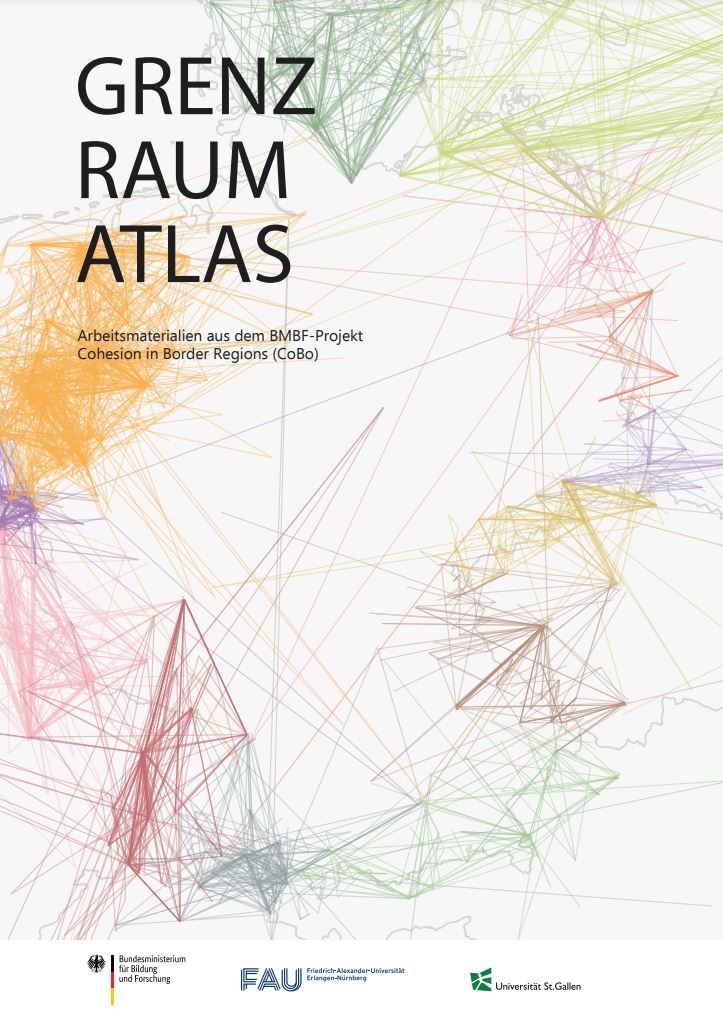CoBo – Cohesion in Border Regions
Border regions of Germany with its neighbouring countries

Many facets of European cohesion are particularly evident at Europe’s internal borders. The CoBo project, funded by the Federal Ministry of Education and Research (BMBF), examined the organisation of cohesion in border regions and explores existing potentials. Cross-border integration and regional prosperity are indeed achievements of cooperation at various levels. Nevertheless, barriers and peripheral locations continue to play a role despite the European integration process. In addition, increasing eurosceptic tendencies can be observed in recent times. Against this background, the question arises as to how the progress achieved in cross-border cohesion can be maintained and, if possible, continued.
In the first step, the project analysed the current developments and prospects of German border regions and positions them in a comparative perspective both among themselves and in a Europe-wide view. Both, socio-economic development and governance settings, wereincluded. The two perspectives were brought together in an overall potential analysis.
The subsequent strategy phase served firstly to deepen the insights in a transdisciplinary manner, secondly to deal with future developments in border regions and their effects on territorial cohesion in a forward-looking manner, and thirdly to derive corresponding recommendations for the various political levels. Several actors from the border regions were involved in this process.
The project’s practical partners played a central role in this project as they were involved throughout the project’s duration (Association of European Border Regions as well as the responsible departments in the Federal Ministry for Housing, Urban Development and Building and the Federal Institute for Research on Building, Urban Affairs and Spatial Development).
The IMP-HSG Institute for Systemic Management and Public Governance at the University of St. Gallen (HSG) supported the project with regard to steering approaches of cross-border spatial development, especially in the field of institutional-political analyses and the connection with concrete instruments of cross-border spatial development.
- Bertram, D., Chilla, T., & Hippe, S. (2023): Cross-border mobility: Rail or road? Space-time-lines as an evidence base for policy debates. Journal of Borderlands Studies, 1-18. Online.
- Hippe, S., Bertram, D. & T. Chilla (2023): Convergence and Resilience in border regions. European Planning Studies. Online.
- Chilla, T., Bertram, D., Hippe, S., Zumbusch, K., Zwicker-Schwarm, D., Beisenwenger, L., Brandenburg, J., Günther, E., Kamolz, D., Mannmeusel, T., Petschler, J., Sachs, R. & C. Schneider (2023): Grenzraumatlas – Arbeitsmaterialien aus dem BMBF-Projekt Cohesion in BorderRegions (CoBo). Online.
- Chilla, T., Bertram, D., Hippe, S., Zumbusch, K., & D. Zwicker-Schwarm (2023): Grenzraumakademie: Grenzregionen Deutschlands mit seinen Nachbarländern – Dokumentation der Konferenz. Online.
- Bertram, D., Chilla, T., & Hippe, S. (2023): The laboratory dimension in cross-border development: insights from the Czech-German border region. Trendy v podnikání – Business Trends, 13(2), 4-16. Online.
- Hippe, S., Bertram, D. & T. Chilla (2022): The COVID-19 pandemic as a catalyst for cross-border cooperation? Lessons learnt for border-regional resilience. Europa XXI, 43, 1. Online.
- Chilla, T. & M. Lambracht (2022): Institutional mapping of cross-boder cooperation. INTERREG programme analyses with KEEP data, European Planning Studies. Online.
- Chilla, T., T. Große, S. Hippe, & B. B. Walker (2022): COVID-19 Incidence in Border Regions: Spatiotemporal Patterns and Border Control Measures. Public Health 202: 80–83. Online.
- Hippe, S., & T. Chilla (2021). Cohesion and Resilience in Czech-German Border Regions: The Impacts of Crises. In Z., Kresa (Hrsg.). Opportunities and Threats to Current Business Management in Cross-border Comparison 2021 (S. 68-78). Chemnitz: GUC. Online.
- Prof. Dr. Tobias Chilla, Institute of Geography, University Erlangen-Nuremberg
- Dominik Bertram, Institute of Geography, University Erlangen-Nuremberg
- Stefan Hippe, Institute of Geography, University Erlangen-Nuremberg
- Dr. Kristina Zumbusch, IMP-HSG Institute for Systemic Management and Public Governance, University of St. Gallen
- Daniel Zwicker-Schwarm, IMP-HSG Institute for Systemic Management and Public Governance, University of St. Gallen
***NEWS***
Grenzraumakademie|Border Region Academy (April 2023) – documentation and atlas online now!
You can find the conference documentation here.

You can find the ‚Grenzraumatlas‘ here.

Dokumentation der Grenzraumakademie vom 20./21. April 2023 und Grenzraumatlas sind online – Deutsch-Polnisches Raumordnungsportal (25.05.2023)
Dokumentacja Akademii Regionów Granicznych z dni 20/21 kwietnia 2023 r. i Atlas Regionów Przygranicznych są dostępne online – Polsko-Niemiecki Portal Gospodarki Przestrzennej (25.05.2023)
A conference and several studies on cross-border cooperation on Germany’s borders – Border Focal Point Network (25.05.2023)
Grenzraumakademie in Berlin on 20-21 April 2023 – Association of European Border Regions (24.05.2023)
So werden Grenzen vom Trennenden zum Verbindenden – Homepage of Rita Schwarzelühr-Sutter, Parliamentary State Secretary to the Federal Minister of the Interior and Community (11.05.2023)
Grenzraumakademie in Berlin: IMeG gestaltet Session zur Krisenfestigkeit von Grenzregionen – Regionalverband Südlicher Oberrhein (03.05.2023)
Several studies on cross-border cooperation on Germany’s borders – Mission Opérationnelle Transfrontalière (01.05.2023)
IMeG-Teilnahme an der Grenzraumakademie 2023 in Berlin – Initiativkreis Metropolitane Grenzregionen (27.04.2023)
Bringing regional development in border regions to the next level – Common Wadden Sea Secretariat (27.04.2023)
In guten Zeiten Vertrauen aufbauen – Homepage of Josha Frey, Member of the State Parliament of Baden-Württemberg (23.04.2023)
